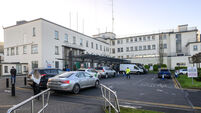Assaults of nurses 'are going up', conference told as INMO calls for legislation on staff levels

General secretary of the INMO Phil Ní Sheaghdha called for legislation on safe staffing numbers to ensure pledges for reform of the health service were met. File picture
Nursing shortages coupled with rising patient numbers have led to heightened stress levels in hospitals, with incidents of aggression now commonplace, nurses and midwives have warned.
At the Irish Nurses and Midwives Organisation (INMO) annual conference in Wexford on Wednesday, members warned hospitals had become volatile workplaces. General secretary of the INMO Phil Ní Sheaghdha called for legislation on safe staffing numbers to ensure pledges for reform of the health service were met.












